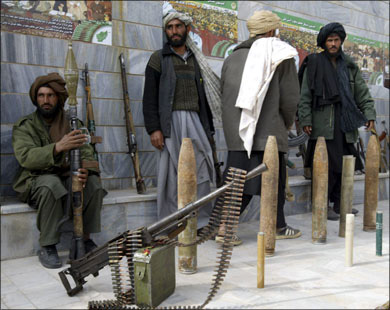Azerbaijan, Baku, July 22 / Trend E. Ostapenko /
The intention of the Afghan government to integrate moderate Taliban into the society will be problematic both because of ideological motives of their struggle, and the inability of the official authorities to fulfill their promised conditions, experts said.
A new strategy of peace and reintegration of former rebels in the Afghan society were among the five strategies prepared by Afghans and presented at an international conference on Afghanistan in Kabul on Tuesday. It is the ninth conference which was first held in the capital of this country.
President Hamid Karzai assumes the allocation of financial assistance to representatives of the Taliban, who want to return to normal life, providing them with jobs and housing. The government's proposals for reconciliation with the Taliban were approved by the conference participants, along with the decision to begin the withdrawal of international military forces from the country by 2014.
This strategy rests on the assumption that Taliban fighters are primarily motivated by money, so that by giving them a more attractive form of employment, they will change to the other side. This is problematic for at least two reasons, Peace Research Institute Oslo Director (PRIO)
Norwegian expert Kristian Berg Harpviken said.
"Firstly, it seems fairly clear that most of those who fight for the Taliban do so either because they belong to a larger solidarity network that has joined the movement en bloc, because of ideological commitment, or because they are angry at the international military forces and the Afghan government for what they do," he told Trend.
Secondly, even if Taliban fighters were tempted to shift sides, they would need a security guarantee to do so. We know that the Taliban is willing to penalize those they see as defectors, and the military alliance has a poor record at guaranteeing security, he said.
International Security Assistance Force (ISAF), operating under the NATO auspices, is in Afghanistan since 2001 - since the overthrow of the Taliban regime. Now ISAF contingent numbers about 140,000 people, including servicemen from the U.S, Germany and other NATO countries.
The Taliban responded at the call of the Afghan authorities to reconcile by rocket attacks on Kabul airport on Tuesday night. There were bombings not far from the fortified quarter in the early morning, where the embassy and governmental agencies were placed.
"This plan will only have an impact if it comes as part of a negotiated settlement between the Government of Afghanistan and the Taliban. Otherwise it is not likely to attract actual fighters, but only Afghans who see the opportunity for short-term financial benefit," Deputy Director, Research Director, Chr. Michelsen Institute (CMI), Arne Strand, said.
President Karzai expects that about 36,000 rank and file rebels will lay down their arms in the nearest five years. But it is not decided what to do with the Taliban leaders yet. British newspaper Quardian reported that Obama's administration is ready to change a strategy and begin secret negotiations with them.
"However, Taliban leaders pursue political and economic goals, but a number of Taliban militants are fighting for religious reasons, and it's impossible to disarm them, offering money, housing, food and other material goods," Ramazan Bashardost, Afghan MP and an Independent Candidate in the upcoming Presidential Elections told Trend.
He said one and a half year ago, based on President Karzai's promises, a number of Taliban fighters and even some of their leaders were disarmed. However, Karzai's promises remained unfulfilled, and the disarmed Taliban fighters have not yet received the promised financial assistance. Therefore, according to Bashardost, the Taliban don't believe the President's promises any more.
"At present, there are 11 million unemployed in the country, and President Karzai even cannot provide citizens with jobs. How will he provide the Taliban fighters with jobs?" Bashardost, Afghanistan's former Planning Minister asked. "All livable places in the country are in mafia's hands, and it is unclear how Karzai can provide the Taliban fighters with accommodation."
After nine years of international forces' presence in Afghanistan, the situation remains critical. Despite the world community's assistance in the amount of billions, Afghanistan remains almost the poorest country in the world. Some 12 million people (there are about 26 million people in the country) live below the poverty line.
During Karzai's power, who is president from 2001, level of drug trafficking in Afghanistan has increased compared to the period of Taliban's governing (1996 - 2001). He failed to suppress the armed resistance of the Taliban fighters, and the real power in the country remains in the hands of warlords. Over the past 20 years, the country has been wallowed in corruption.
According to the International Council on Security and Development, Taliban now holds a permanent presence in 80 percent of Afghanistan (mostly in south and south-east of the country), whereas in November 2008, his presence was only 72 percent, and in 2007 - 54 percent.
Trying to drive a wedge between moderate and extremist factions of the Taliban is a sound strategy provided it is carried out with sufficient resources, in a sustained manner, and based on domestic support, Christian Tuschhoff, expert on Afghanistan believes.
"The strategy will fail, if the moderate Taliban believe that their cooperation will not be rewarded over extended periods of time but expose them to the extremists before they are capable to defend themselves," Political Science Fellow at German Otto-Suhr-Institute said.
He said the strategy also requires that the West is both willing and able to outspend the Taliban. Currently, this is not the case. Taliban fighters receive more money than the Afghan policy and security forces officers.
Community of the Western countries, which are financial donors of humanitarian aid and international military mission in Afghanistan, were becoming increasingly dissatisfied over the allocation of funds and human resources for the Afghan campaign, which for nine years has led to the deaths of thousands of soldiers and did not achieve its goals.
D.Khatinoglu contributed to the article.






